Events
Jury
Prof. Dr. Barthold Kuijken (BE) | Chairman
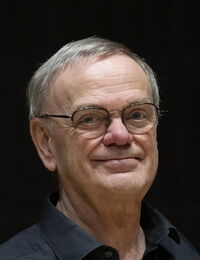
Barthold Kuijken, a native of Flemish Belgium, has had a significant influence on historical performance practice over the past 40 years. While he was still studying the modern flute, he began to further his education using 17th and 18th century sources and instruments. The result of his many years of research and his reflections on music is the book The Notation Is Not the Music (2013).
In addition to his legendary performances as a flute soloist with his brothers Sigiswald (violin) and Wieland (violoncello and viola da gamba), he collaborated with many other early music specialists. He has also made numerous recordings with the baroque orchestras Collegium Aureum and La petite Bande. In 2014 he retired as a professor for flute at the Royal Conservatories of Brussels and The Hague, but continues to perform in Europe, the United States and Japan and is currently artistic director and conductor of the Indianapolis Baroque Orchestra.
Kuijken has published scholarly editions of 18th century works such as Telemann’s fantasias for transverse flute and an annotated Urtext edition of J. S. Bach’s sonatas for transverse flute. In 2013, he was honored by the US National Flute Association with the Lifetime Achievement Award. The sought-after juror has been an honorary member of the International Telemann Society since 2021 and was awarded the Telemann Prize of the state capital Magdeburg in 2024.
Jury historic string instruments
Mime Brinkmann (SE/JP)

After completing her diploma in modern cello at the Toho Gakuen School of Music in Tokyo, Mime Brinkmann received a scholarship from the Netherlands Arts Council and continued her studies with a focus on historical performance practice on the cello and viola da gamba at the Royal Conservatory in The Hague, where she graduated with a soloist diploma.
Brinkmann frequently performs as a soloist, chamber musician and as a member of various ensembles, with whom she attended numerous festivals and concert halls worldwide. Several of her recordings have been critically acclaimed by magazines such as The Strad, Gramophone UK and Diapason. She is also known for her active involvement in the theater world. For example, she has worked on numerous programs that combine elements of music, literature, dance, circus, light design and pantomime. One of her most successful children’s shows, Hum Hume, has been performed 21 times at the Royal Palace Theater in Drottningholm, Sweden, and has entertained more than 2000 children.
In 2022, Brinkmann received a 10-year art scholarship from the Swedish Arts Council, which will support her creative activities until 2031. More recently, the Villa San Michel Foundation awarded her a three-week residency on the island of Capri. She has been a cello teacher at the Royal College of Music in Stockholm since 2005 and teaches master classes at music schools and festivals around the world to foster the talents of young musicians.
Prof. Enrico Gatti (IT)
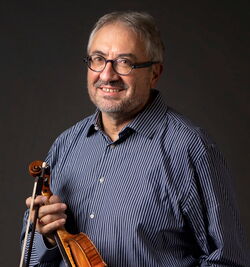
Enrico Gatti has dedicated himself to the repertoire of the 17th and 18th centuries. He studied with Chiara Banchini in Geneva and Sigiswald Kuijken in The Hague. After completing his studies, he performed worldwide with numerous ensembles including La Petite Bande, Ensemble 415 and Concerto Palatino and conducted orchestras such as Les Arts Florissants, Bach Collegium Japan, Concerto Köln and Les Muffatti.
Gatti is artistic director of the Ensemble Aurora, which he founded in 1986. He has made recordings for various international labels as well as for numerous radio stations. He was awarded the first Antonio Vivaldi prize in 1993 and 1998, the Preis der deutschen Schallplattenkritik and the Diapason d’or several times. As a professor, he teaches historical violin at the Royal Conservatory in The Hague and at the Conservatorio Giovanni Battista Martini in Bologna and is a sought-after lecturer for master classes at many universities and music schools.
He is a member of the research committee for the critical edition of the complete works of Alessandro Stradella. To mark the 300th anniversary of Arcangelo Corelli’s death in 2013, Gatti unearthed twelve unpublished sonatas by Corelli. In 2023, he launched a new research project on Giuseppe Torelli. His most recent work, Praeconium Solitudinis, has been described as “a new paradigm of musical utopia”.
Prof. Mechthild Karkow (DE)
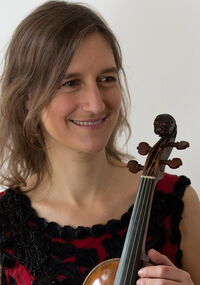
Baroque violinist Mechthild Karkow is one of the most versatile experts in the field of historical performance practice. Her repertoire covers the period from the end of the 16th to the beginning of the 20th century and also includes contemporary compositions. The examination of historical sources and instruments as well as the consideration of different playing techniques appropriate to the repertoire form the basis for her stylistically differentiated and lively interpretations.
Karkow performs internationally as a soloist, concertmaster and chamber musician in various ensembles and has appeared at renowned festivals in Germany and abroad. She has been awarded prizes at international competitions and has participated in numerous radio and CD recordings. In addition to working with musicians such as Christophe Coin, Andrea Marcon and Marieke Spaans, she is artistic director of orchestras such as the Bremen Philharmonic Orchestra and the Freiburg Baroque Orchestra.
She has been a professor of baroque violin and baroque viola at the University of Music and Theatre “Felix Mendelssohn Bartholdy” Leipzig since 2013 and also at the Frankfurt University of Music and Performing Arts until 2021. In the winter semester 2020/21, she was appointed professor of baroque violin and baroque viola at the University of the Arts Bremen, where she has since played a key role in shaping the Early Music department.
Arnie Tanimoto (USA/JP)
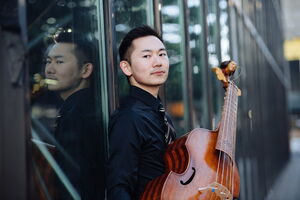
Gold medalist and first-ever American laureate of the International Bach-Abel Competition (2018) Arnie Tanimoto has quickly established himself as one of the foremost viola da gamba players in the United States. He has performed and recorded in venues across North America and Europe with the likes of Barthold Kuijken, the Boston Early Music Festival Ensemble, and the Smithsonian Consort of Viols.
Tanimoto was the first-ever viola da gamba major at the Juilliard School, where he soloed on both viola da gamba and baroque cello. In 2017 he was awarded with a Frank Huntington Beebe Fund Fellowship and subsequently finished his studies at the Schola Cantorum Basiliensis in Basel, Switzerland. His principal teachers include Paolo Pandolfo, Sarah Cunningham, Christel Thielmann, and Catharina Meints. He holds additional degrees from Oberlin Conservatory and the Eastman School of Music.
He is a core member of the early music ensemble Mountainside Baroque and a founding member of the Baroque-style Academy of Sacred Drama. Alongside harpist Parker Ramsay, he co-directs the New York-based period-instrument ensemble A Golden Wire. As a teacher Tanimoto serves on faculty at Princeton University, as well as maintaining a private studio. He also regularly teaches at the Mountainside Baroque Summer Academy (Cumberland, Maryland) and the Viola da Gamba Society of America’s annual Conclave.
Jury chamber music ensembles
Prof. Alfredo Bernardini (IT)
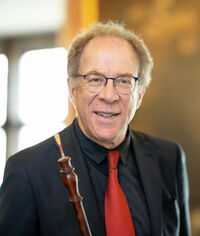
Born in Rome, Alfredo Bernardini moved to the Netherlands in 1981 to specialize in baroque oboe and early music. Since his student days, he has performed worldwide as a member of numerous renowned baroque ensembles, including La Petite Bande, The English Concert, the Amsterdam Baroque Orchestra & Choir, the Bach Collegium Japan, the Berliner Barock Compagney and the Finnish Baroque Orchestra.
In 1989 he founded the ensemble Zefiro with the brothers Paolo (oboe) and Alberto Grazzi (bassoon), which has since performed in various formations. As a guest conductor Bernardini has worked with various baroque orchestras such as the Swedish Concerto Copenhagen. He has also conducted the European Union Baroque Orchestra (Eubo) on several occasions, with whom he has performed in Germany, Spain and China. From 2018 to 2023, he was appointed director of a project at the Styriarte Festival Graz dedicated to the operas of Johann Josef Fux.
Above that, Bernardini is committed to supporting young musicians: In January 2013 he was the advisor and artistic director of the first baroque orchestra project of the Venezuelan program El Sistema de Música and since 2016 he has conducted the international classical youth orchestra Theresia. From 1992 to 2015 he taught baroque oboe at the Conservatorium van Amsterdam, from 2002 to 2009 at the Catalonia College of Music in Barcelona and since 2014 he has been a professor at the Mozarteum University Salzburg.
Prof. Dorothee Oberlinger (DE)
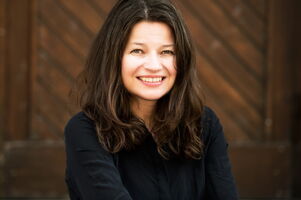
Recorder player Dorothee Oberlinger, who has been awarded the Telemann Prize of the state capital Magdeburg, is one of the internationally acclaimed personalities in the field of early music. In 1997 she was awarded first prize in the international competition of the Society of Recorder Players for her international debut in London. Ever after, she has been invited to numerous renowned festivals and concert halls around the world.
She has worked as a soloist with the Ensemble 1700, which she founded in 2002, as well as with various orchestras. She is also festival director of the Potsdam Sanssouci Music Festival and the Bad Arolsen Baroque Festival. Oberlinger made her debut as an opera conductor in 2017 with Handel’s Lucio Cornelio Silla at the Göttingen Handel Festival. Further projects were funded by the Ministry of Culture and Science of the State of North Rhine-Westphalia in the years 2022-2024.
She has been a professor at the Mozarteum University Salzburg since 2004, where she headed the Institute for Early Music until 2018 and established it an internationally recognized institution for research into historical performance practice. In addition, she also devotes herself to contemporary music and the avant-garde. For example, she was involved in the 2009 album Touch by Swiss pop duo Yello. Oberlinger is an honorary citizen of her hometown of Simmern. In 2021, she was awarded the Order of Merit of the Federal Republic of Germany for her cultural services.
Prof. Nicholas Parle (AUS)
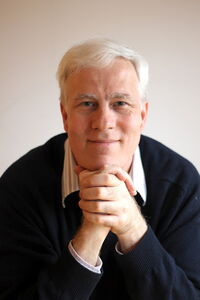
Australian-born Nicholas Parle is Professor of Harpsichord at the Music and Arts Private University of the City of Vienna (MUK) and also teaches at the Guildhall School of Music and Drama in London. From 2004 to 2018 he was professor of harpsichord and other historical keyboard instruments at the University of Music and Theatre “Felix Mendelssohn Bartholdy” Leipzig.
After obtaining his Bachelor of Music degree at the University of Sydney, he moved to London to further hone his artistic skills. Since then, he has worked with numerous leading early music ensembles, including the English Concert, the Academy of Ancient Music, the Collegium Musicum 90 and the Orchestra of the Age of the Enlightenment. As a soloist and ensemble member, he has recorded works by Albinoni, J. S. Bach, Handel, Telemann and Vivaldi, among others.
In 1989 he won first prize at the International Harpsichord Competition in Bruges, Belgium, which has only been awarded three times in the competition’s 30-year history. He also completed a Master of Music in Musicology at Royal Holloway, University of London, in 2014 and continues to learn from his colleagues and students around the world.
